Residential Construction is an industry dependent on the crucial task of cost estimates. Estimations need to be accurate and widespread in the factors accounted for and must stick within budgets for all homeowners. However, Inadequacies often blight the calculations and associated processes of takeoff. Estimates either covered too little or too much ground, leaving home builders the task of mitigating frailties in the budget whenever necessary. A modern and digital solution to address this is the residential construction estimating software that plugs all the holes arising due to inefficiency and inadequacy in manual estimations while offering users more functionality to approach cost estimations.
This blog on top free and open-source residential construction estimating software highlights the features, advantages, necessities, and multi-faceted approaches to estimating using construction estimating software. The blog will help alleviate all doubts about using a plethora of capable choices from this software category. So, what are you waiting for? Read on below to understand the many benefits of free and open-source residential construction estimating software!
Why is Estimation the Most Important Step in the Residential Construction Process?
Residential construction estimation can make or break a project, irrespective of the scope, scale, and size of the residential projects. First, estimates control the project’s total cost, factoring inflation, indirect expenses, labor and material bills, service charges, etc. A low estimate could spend project costs spiraling out of control of vastly under-utilized available funds - although it is more former than the latter.
Second, project estimates affect project schedules. Estimates help lay the foundation for a set workflow within project operations; they lay down the timeframe for ordering goods and capabilities needed to complete the project. Constant estimate reworks or poorly executed residential construction estimation will lead to delayed take-off, inaccurate completion dates, and sometimes project closures.
Third, Estimates are crucial for communicating requirements with vendors. Poor estimates will lead to miscommunications between vendors, contractors, and sub-contractors, leading to strained third-party relationships. Fourth, estimates help customers maintain financial security by giving them an overview of total expenses and how far they can stretch their budgets to meet ad-hoc construction requirements or personal changes.
Types of Cost Estimates in Residential Construction
There are three general cost estimate categories in residential construction. They are:
- Design Estimates - These estimates take ground at the planning stage of the project. It includes preliminary estimates, engineer’s estimates (Plinth Area, Cube Rate Cost, etc.), definitive estimates, and order magnitude estimates (screening, approximate quantity method).
- Bid Estimates - The formulation of these estimates considers investor sentiment and ensures the excellent quality of the bid for competitive bidding and negotiation purposes. Bid estimates only include the direct construction costs - subcontractor quotes, takeoff quantity, and field supervision, besides other construction process costs.
- Control estimates- These are the estimates vital to the project’s operations, i.e., while the project is on. A control estimate accounts for the project’s total budgeted cost before construction and the cost of operations during construction. It also determines the entire budget before financing begins.
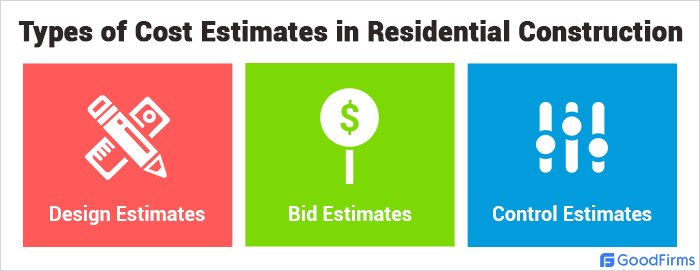
Effects of Improper Residential Construction Estimation
The planning stage of residential construction projects happens on a constant knife-edge. The contractor, sub-contractors, and even customers can comfortably achieve benchmarks in most of the parameters and factors that impact residential construction. However, a poorly construed residential construction estimation can disintegrate all the hard work done in the other steps. The side effects of poor residential construction estimation are as follows:
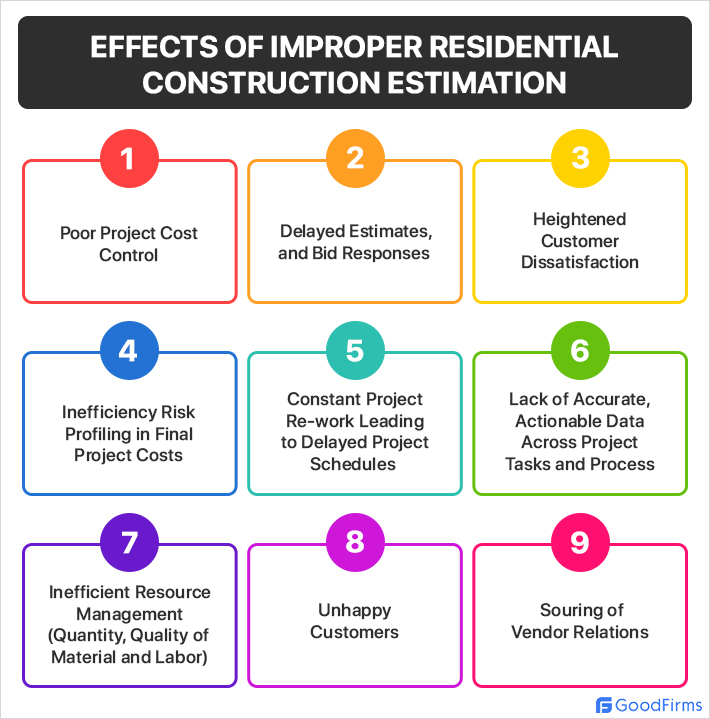
What is Residential Construction Estimating Software?
Residential construction estimating software is a collection of digital tools, functions, and applications that aid construction management companies in accurately predicting the total cost of a residential construction project. It factors in multiple parameters, including Bill of Materials (BoM), quality of bid to win a project, indirect and unforeseen expenditures, etc. Residential estimating software lays the platform for efficient project scheduling, process workflows, team collaborations, and improved financial control to ensure customer satisfaction with project management.
Today, most advantages of construction estimator programs come with a database that tracks the live costs of materials in the market. Several estimation-related functions introduce heavy-duty calculations in the flick of a button. Also called take-off software, the best residential construction estimating software reduces the total time for estimates, creates and stores estimate records in easily shareable workbooks, and maintains data security with platform independence and multi-modular deployment models.
Role of Residential Construction Estimating Software in Project Transparency
Residential construction estimating software simplifies the management of funds that are available for use in the project. It helps track various financial and billable expenses incurred in the project and reports over-expenditure instantly. As most residential construction estimating software has built-in and dynamic materials price lists updated over the cloud, users can compare every expenditure to the original estimate. Estimates also play a vital role in tracking the schedules of tasks and the disbursement of funds per schedule. It helps meet timely expenses while at the same time, keeping an audit trail of funds.
Cost-Saving Features of Residential Construction Estimating Software
The best features of construction estimating software are as follows:
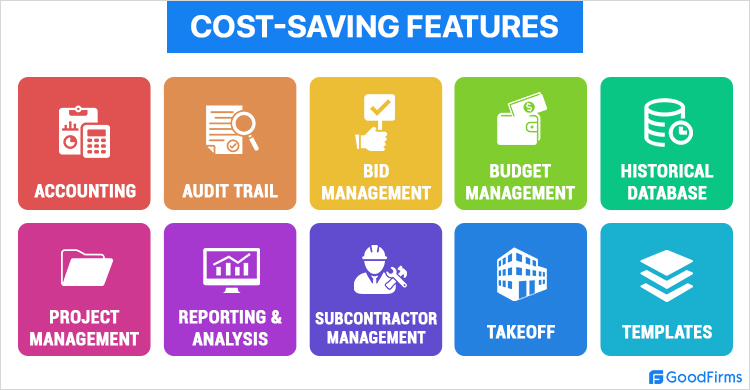
Advantages of Residential Construction Estimating Software
Residential software construction is a boon for many organizations looking to gain a competitive edge in the ever-expanding residential construction market. Some of the most significant benefits of residential construction estimating software are as follows:
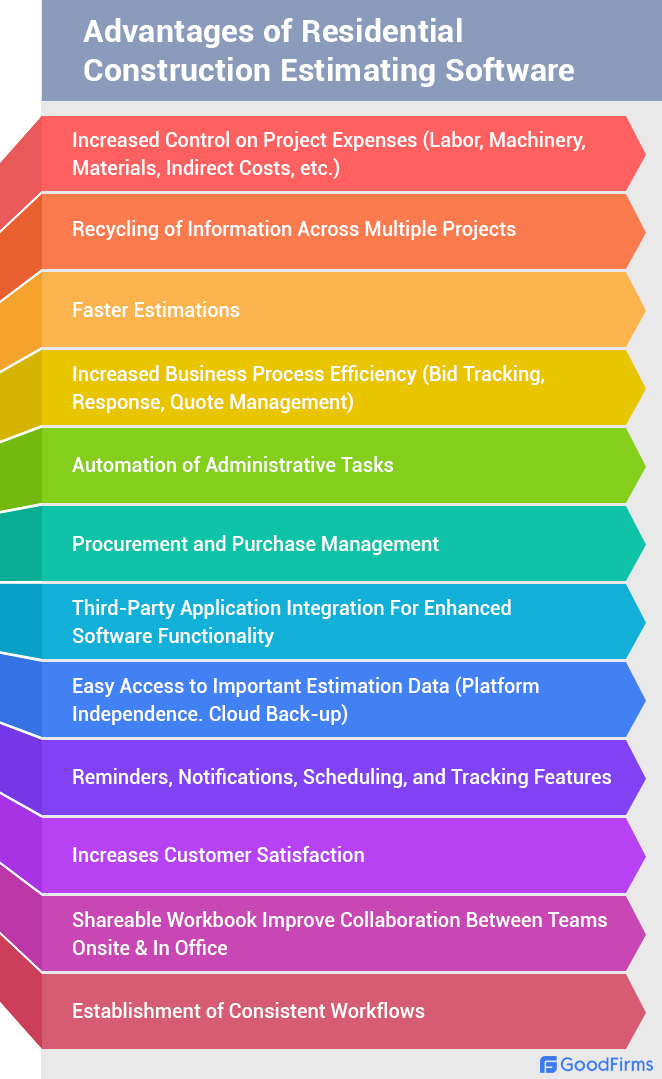
Market Options for Free and Open Source Residential Construction Estimating Software
The residential construction estimating software market is replete with business-compatible, feature-laden, and affordable software. Below, let's look at some of the free and open-source software available.
Comparison Chart of Top 8 Free and Open Source Residential Construction Estimating Software
#1 Estimate
Estimate is a free and open-source residential construction software that supports residential projects and enterprise and government infrastructure projects. Composed of a clean user interface and accessible over any leading internet browser, the home construction estimating software adheres to the GNU Affero General Public License. The estimating program assures users of data security by implementing user authorization, promising better ROI, a higher bid conversion rate, and efficient cost management. Besides project management, the construction cost estimating software also implements client and customer management features. The latest version of the software is 2.1.1. It is platform-independent and supports over 200 users at a time.
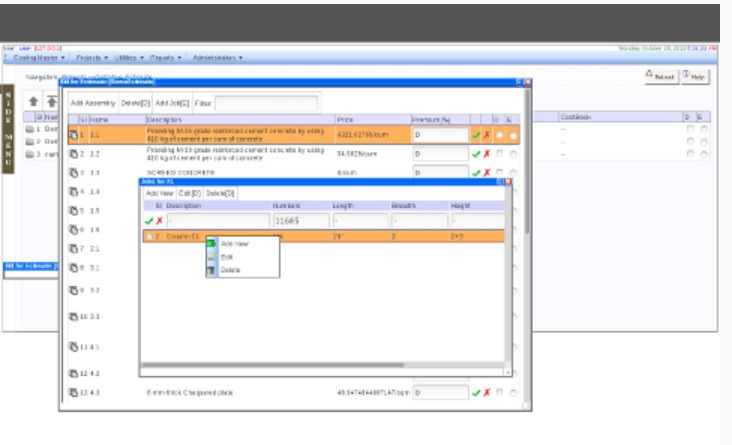
Source - Estimate
The critical features of Estimate are:
- Audit Trail
- Bid Management
- Historical Database
- Project Management
- Subcontractor Management
- Takeoff
#2 CatalystK
CatalystK is an ERP solution software with a free and open-source residential construction estimating software module. The platform-independent home construction cost estimating software helps generate detailed proposals while automating follow-ups to calculated estimates. The software comprises various functions such as invoice management, vendor identification and management, sales workflow, automated reporting, estimations with and without images, etc. The software helps audit the construction process and record the inflow and outflow of materials and currency while ensuring inventory tracking. The program’s sole purpose is to help builders make richer, detailed estimates in a short time frame and prevent the customer from overpaying.
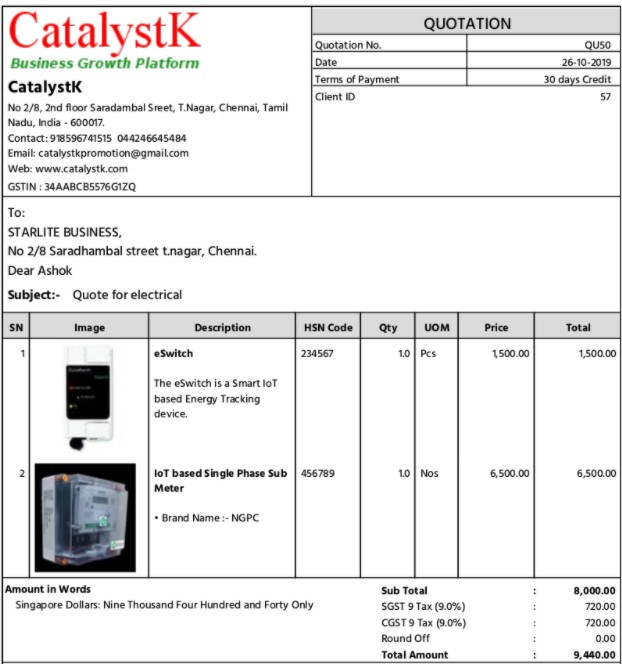
Source - CatalystK
The features that set CatalystK residential construction estimation software apart are:
- Accounting
- Audit Trail
- Historical Database
- Reporting & Analysis
- Subcontractor Management
- Templates
#3 Stack
Stack is a free residential construction estimating software, which forms a part of its complete functionality in the construction management industry. Stack’s free residential construction estimating software allows builders to manage bids efficiently while providing tools to make accurate estimates. The software wants to give builders the ability to maintain profit margins while ensuring compliance with the bid management process. Features such as remote access, vendor management, bill of materials, proposal management, and automation of estimates make this one of the best-estimating software on the market. The software also promises data and access security while promoting third-party integrations and platform independence.
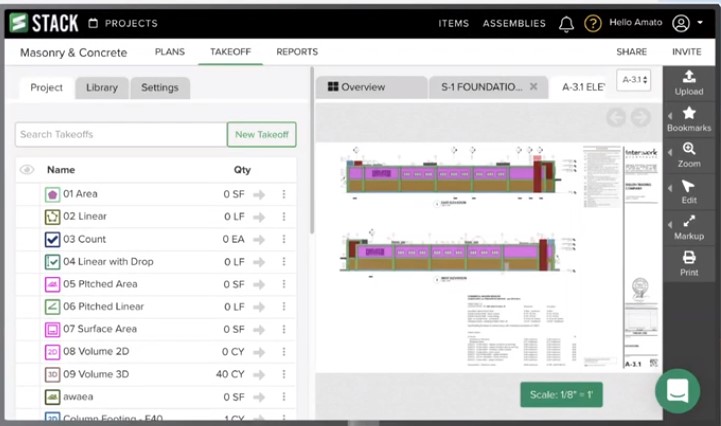
Source - Stack
Stack residential estimating software has the following features:
- Bid Management
- Historical Database
- Reporting & Analysis
- Subcontractor Management
- Takeoff
- Templates
#4 Joyne
Joyne is a free residential construction estimating software. The construction cost estimating software has its live database of material costs while also providing users with the capability of producing bespoke BoQs in Excel using the data from the database or their labor and material costs. The construction estimator program reminds users of expiring bids and collates status updates of estimations on one centralized dashboard. The building estimating software is wholly based in the cloud and provides secure access to users to access blueprints and estimations. Furthermore, the software also offers its estimation services to contractors and builders by in-house experts. Custom formulae and auto-fill are just some of the other features the free residential construction takeoff software offers.
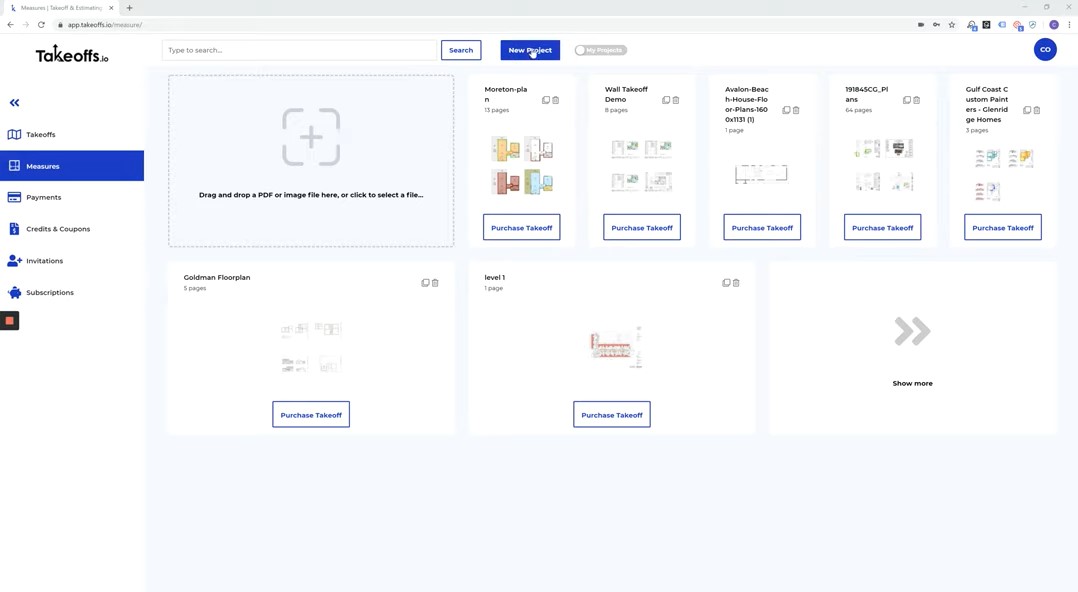
Source - Joyne
The features of the Joyne residential construction estimating system are:
- Audit Trail
- Bid Management
- Budget Management
- Historical Database
- Subcontractor Management
- Takeoff
#5 Methvin
Methvin is a free residential construction estimating software. The construction estimating system plays a vital role in helping builders win bids by analyzing and providing quality cost estimates. The software operates by cutting workflows in a project into smaller sub-tasks and subsequently building an estimate to complete each task’s subset. It takes care of improving margins for builders. Methvin’s construction cost estimating software allows users to use custom variables when calculating estimates in its online workbook and use them in standard mathematical functions. Dynamic worksheets reduce the time for estimates, while the construction estimating system integrates active worksheets into use.
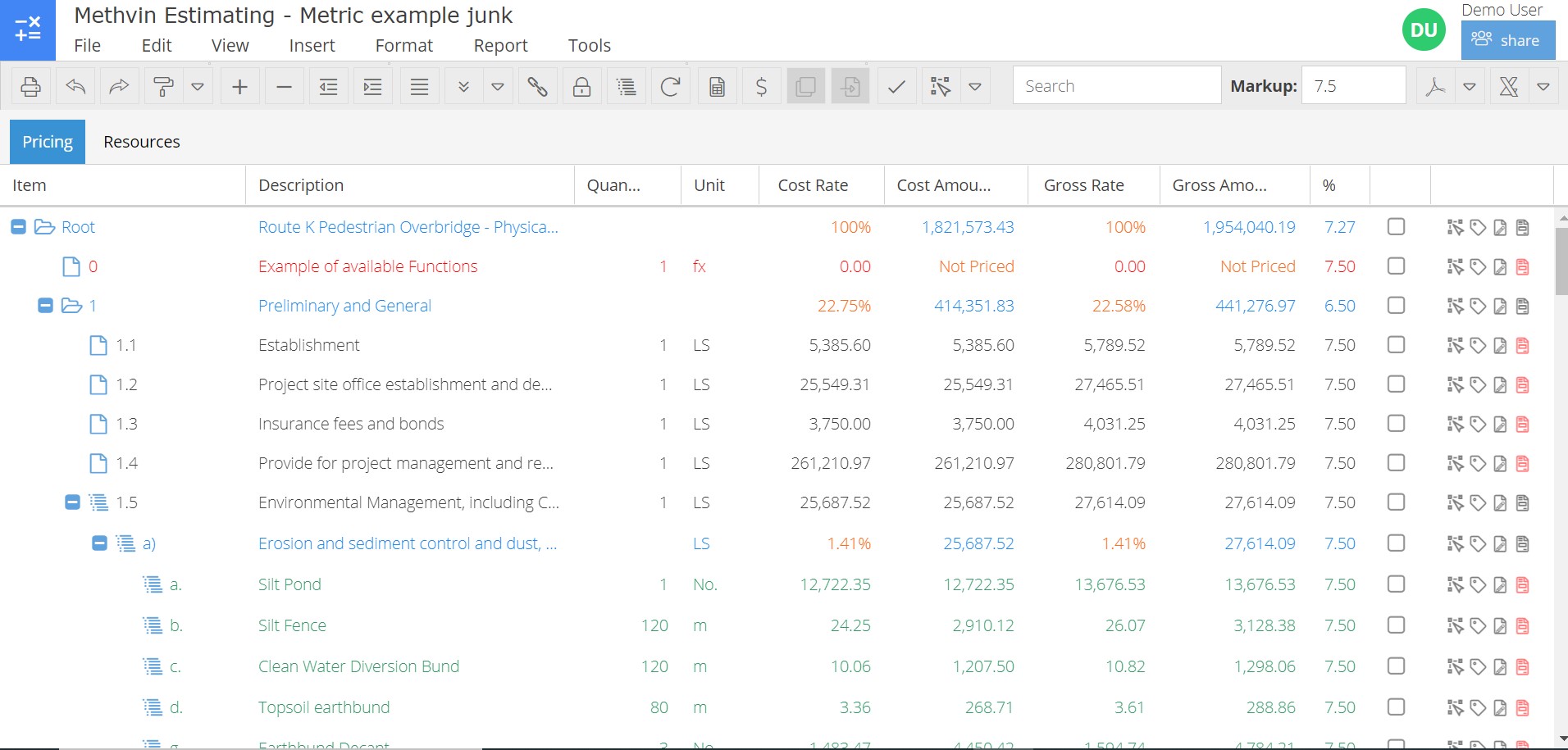
Source - Methvin
Methvin construction estimating software has the following indispensable features:
- Accounting
- Audit Trail
- Bid Management
- Budget Management
- Historical Database
- Project Management
- Reporting & Analysis
- Subcontractor Management
- Takeoff
- Templates
#6 CostMiner
CostMiner is a trial-based residential construction estimating software. The Construction estimating system makes estimations easy with preset job templates, which integrate live material rates and easily insertable data for quick estimate calculations. CostMiner construction cost estimating software also includes composite rates for the same construction jobs. The home construction cost estimating software claims to be one of the easiest to use on the market and offers cloud computing. Users can export data to Excel while tracking quotes and invoices. The construction estimating software also issues quick progress claims, besides custom workspaces to complete projects. The Building estimating software comes bundled with a take-off software which is also feature-rich.
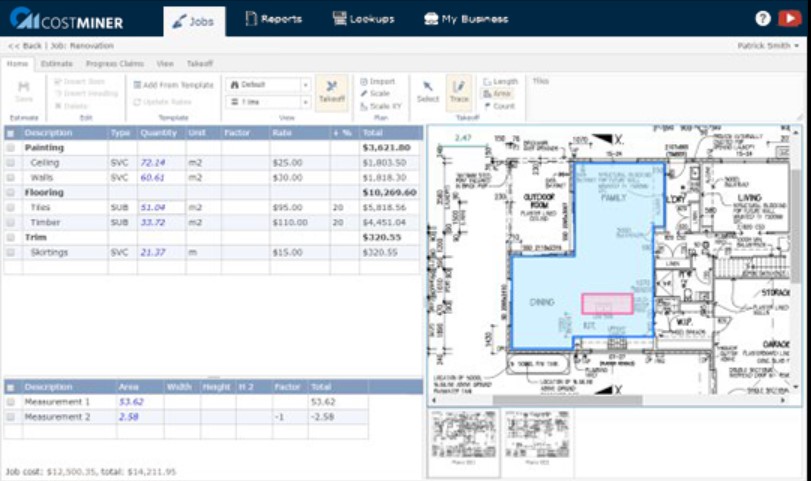
Source - CostMiner
CostMiner home construction estimating software encompasses these features:
- Audit Trail
- Budget Management
- Project Management
- Reporting & Analysis
- Subcontractor Management
- Takeoff
#7 CostCertified
Cost Certified is a free-trial-based residential construction estimating software. The construction cost estimating software promises to bring the supplier, contractor, and customer on the same plane as far as residential construction estimates go. The residential estimating software is a top choice considering its accuracy in estimates, combined with calculations’ speed. Furthermore, the vendor and contractor maintain a real-time log of materials list alongside their rates, which facilitates real-time bid management. The contractor also has access to several CRM features, while changes in design/order are easily trackable. The digital proposals feature constructors save important data in templates reusable over a host of construction projects. Besides providing a centralized hub for all relevant project data, one of the best residential construction estimating software ensures data security with adept file management and user authentication access only.
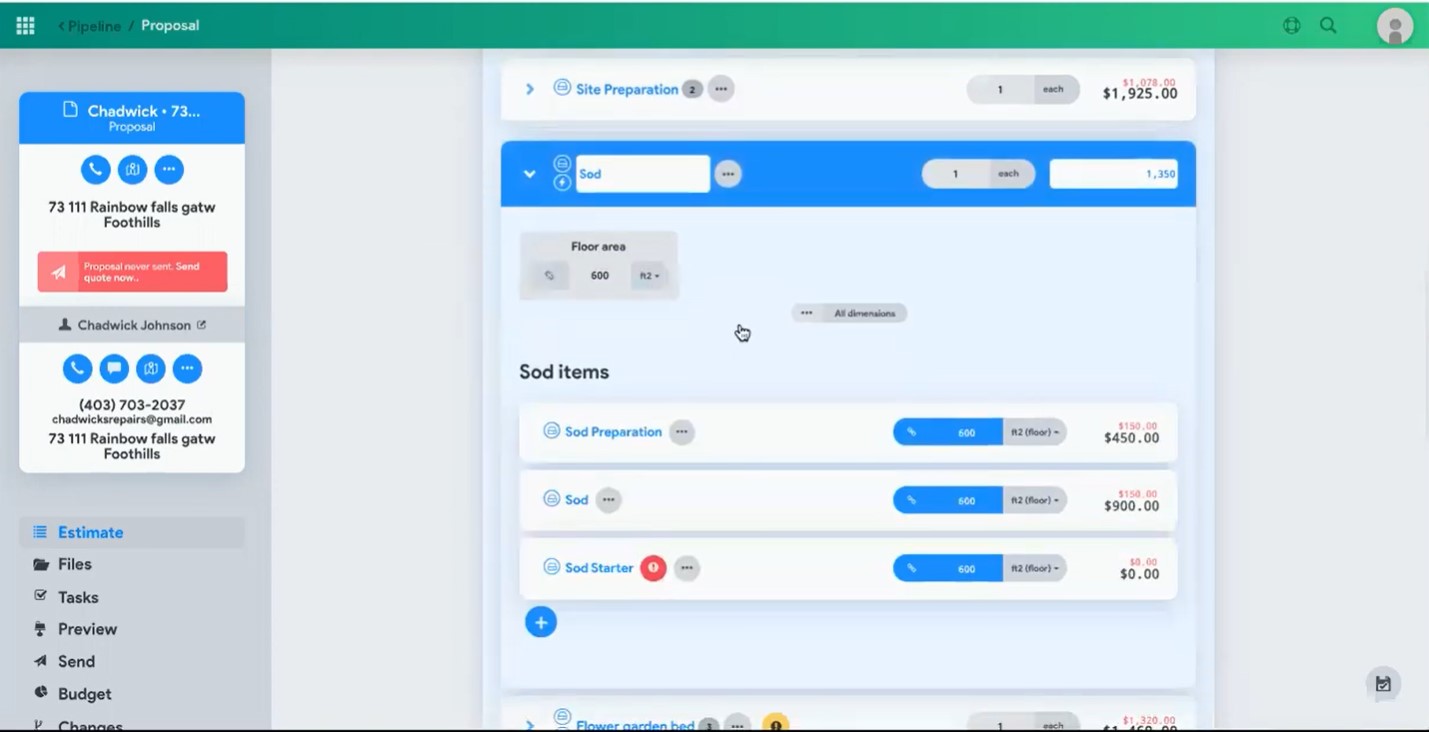
Source - CostCertified
CostCertified Home building estimating software’s features include:
- Accounting
- Audit Trail
- Bid Management
- Budget Management
- Project Management
- Reporting & Analysis
- Subcontractor Management
- Takeoff
- Templates
#8 PriMus
PriMus by ACCA Software is a Building Information Management (BIM) software with specific residential construction estimating software features and takeoff management. The software provides dedicated functions for quote management, has an exclusive price list of six million items for materials cost tracking, and a rate analytics engine. The home construction estimating software allows you to convert files into Excel format for easy sharing. It offers users the chance to transform their price books and referential price ranges of standard materials, as ordered in the PRiMus database. Besides economic and financial planning, the estimating program also schedules Gantt charts in its Krono edition. The home building estimating software’s bespoke take-off solution comes equipped with dynamic price updates as per the type and quantity of ‘BIM object’ additions to the project.
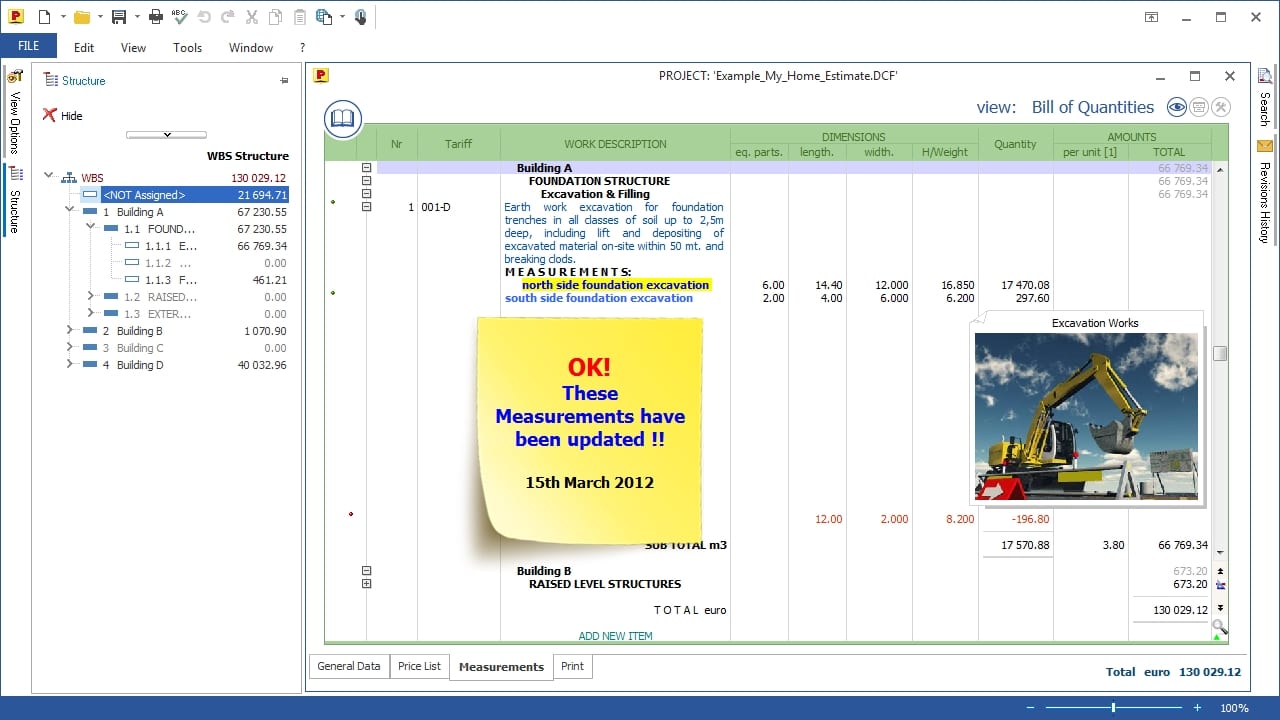
Source - PriMus
PriMus Construction estimator program has these essential features:
- Bid Management
- Budget Management
- Project Management
- Historical Database
- Subcontractor Management
- Takeoff
As noted above, the residential construction estimating software market is diverse, with many capable options. However, beyond the free and open-source residential construction estimating software available, one residential estimating software that continues to gush the market with its offerings is Estimator360. Let us take a closer look at the construction estimator program below.
Estimator360
Estimator360 is a premium residential construction estimating software. Users can begin and store unlimited projects, while the estimator program dynamically updates estimates as per changes in design and contracts and helps users maintain an eagle eye on proposals. The home construction cost estimating software allows scheduling to proceed as per estimates. Also, the total package included is a dedicated mobile application where time-tracking and associated analytics are possible. The home construction estimating software allows integration of supplier and subcontractor dashboards for a centralized vendor management view while also offering Quickbooks integration. The residential estimating software’s digital take-off tool also provides an audit trail to capture financial estimates based on quantities.
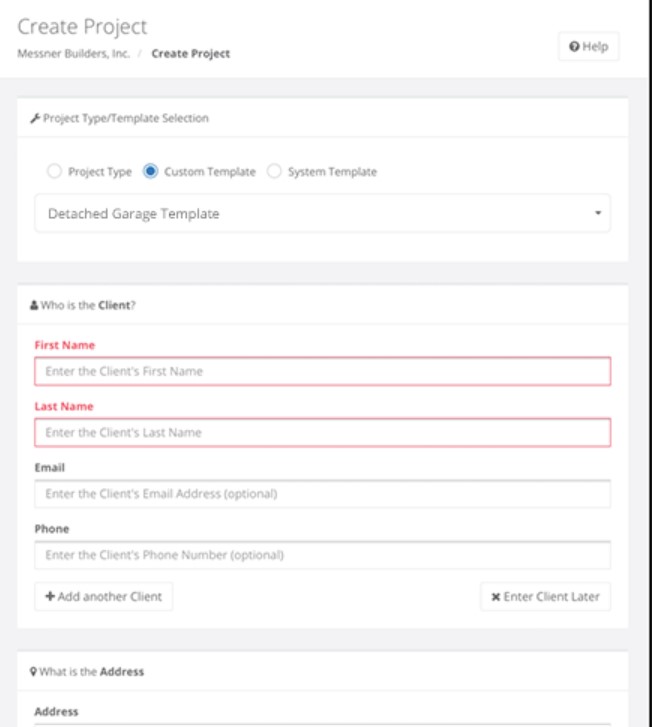
Source - Estimator360
The estimation-enhancing features of Estimator360 are:
- Audit Trail
- Budget Management
- Historical Database
- Project Management
- Reporting & Analysis
- Takeoff
Conclusion
With the US residential construction market set to become $503 Bn in value by 2021, there is enormous scope for building estimating software organizations to make their mark and ensure projects have the best estimates, especially when one million homes are still under construction in 2021. Things are looking up for residential construction estimating software firms - a Deloitte study revealed that 76 percent of construction company CEOs want to invest in digital technologies, and the same percentage are willing to invest in upgrades. The above statistics will show the urgency of implementing building estimating software and the solutions that are present in the market to address these needs.
As mentioned earlier, please use our feedback portal to submit reviews on any of the software we covered in the list. The comments section is available below for readers to voice their opinions on the article.
For those planning to purchase residential construction estimating software soon - please refer to our exceptionally constructed Buyers Guide for residential construction estimating software. Businesses not explicitly looking at residential construction estimating software may refer to Goodfirms’ Software Directory to access distinct software advantages.




